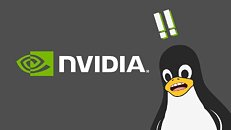- Joined
- Aug 19, 2017
- Messages
- 2,996 (1.06/day)
Just a few months after hiring Ben Skeggs, a lead maintainer of the open-source NVIDIA GPU driver for Linux kernel, NVIDIA has announced a complete transition to open-source GPU kernel modules in its upcoming R560 driver release for Linux. This decision comes two years after the company's initial foray into open-source territory with the R515 driver in May 2022. The tech giant began focusing on data center compute GPUs, while GeForce and Workstation GPU support remained in the alpha stages. Now, after extensive development and optimization, NVIDIA reports that its open-source modules have achieved performance parity with, and in some cases surpassed, their closed-source counterparts. This transition brings a host of new capabilities, including heterogeneous memory management support, confidential computing features, and compatibility with NVIDIA's Grace platform's coherent memory architectures.
The move to open-source is expected to foster greater collaboration within the Linux ecosystem and potentially lead to faster bug fixes and feature improvements. However, not all GPUs will be compatible with the new open-source modules. While cutting-edge platforms like NVIDIA Grace Hopper and Blackwell will require open-source drivers, older GPUs from the Maxwell, Pascal, or Volta architectures must stick with proprietary drivers. NVIDIA has developed a detection helper script to guide driver selection for users who are unsure about compatibility. The shift also brings changes to NVIDIA's installation processes. The default driver version for most installation methods will now be the open-source variant. This affects package managers with the CUDA meta package, run file installations and even Windows Subsystem for Linux.

View at TechPowerUp Main Site | Source
The move to open-source is expected to foster greater collaboration within the Linux ecosystem and potentially lead to faster bug fixes and feature improvements. However, not all GPUs will be compatible with the new open-source modules. While cutting-edge platforms like NVIDIA Grace Hopper and Blackwell will require open-source drivers, older GPUs from the Maxwell, Pascal, or Volta architectures must stick with proprietary drivers. NVIDIA has developed a detection helper script to guide driver selection for users who are unsure about compatibility. The shift also brings changes to NVIDIA's installation processes. The default driver version for most installation methods will now be the open-source variant. This affects package managers with the CUDA meta package, run file installations and even Windows Subsystem for Linux.

View at TechPowerUp Main Site | Source






